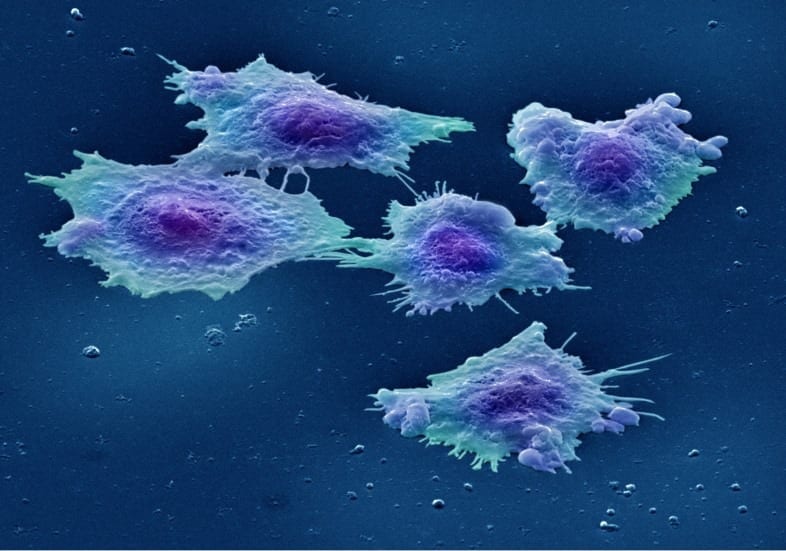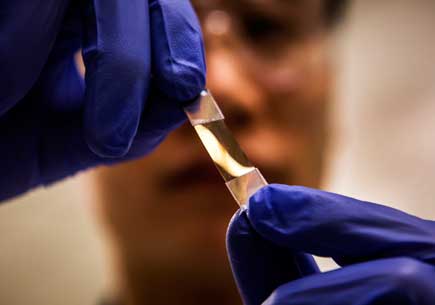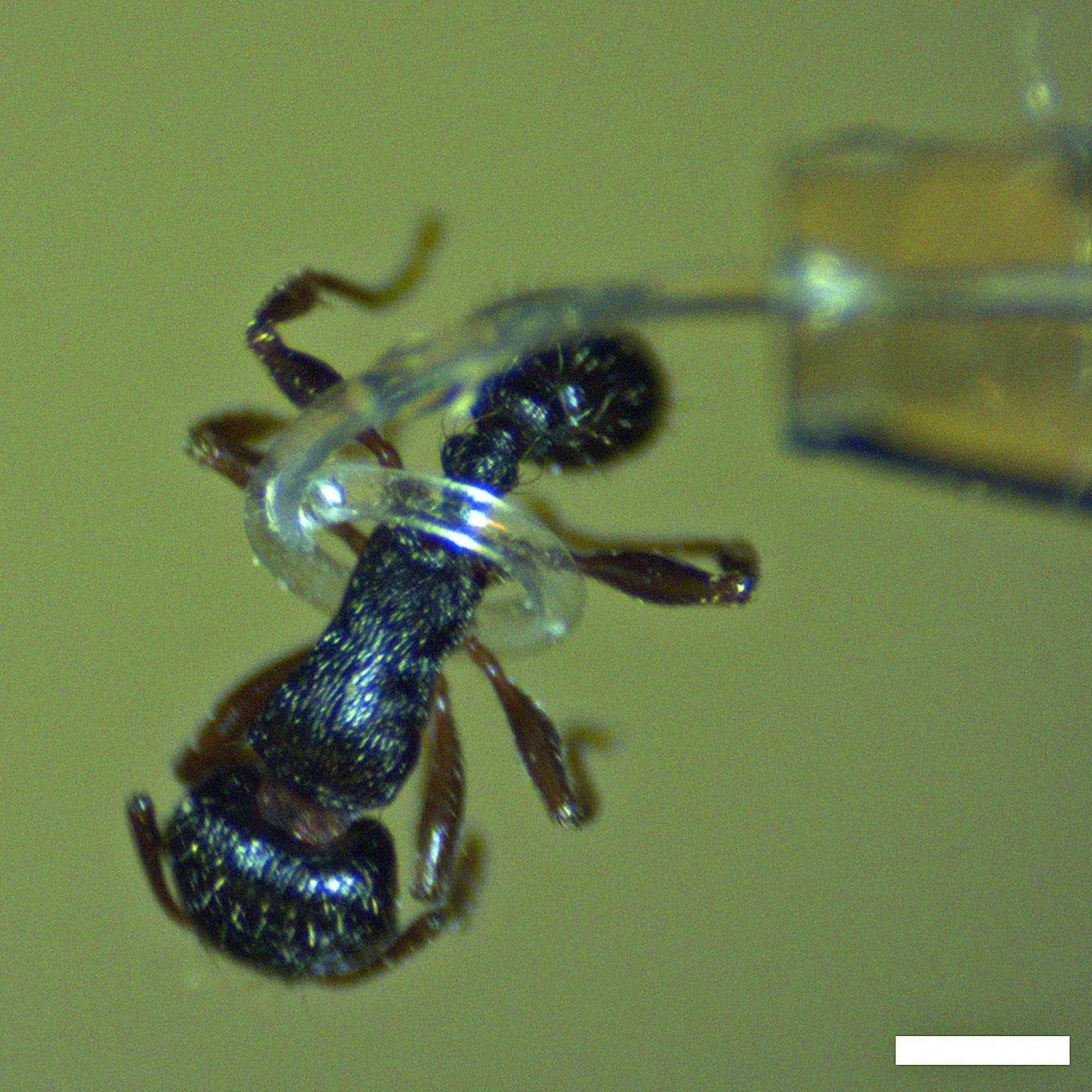
Credit: Annie Cavanagh. Wellcome Images
Anti-cancer strategies generally involve killing off tumor cells. However, cancer cells may instead be coaxed to turn back into normal tissue simply by reactivating a single gene, according to a study published June 18th in the journal Cell.
Researchers found that restoring normal levels of a human colorectal cancer gene in mice stopped tumor growth and re-established normal intestinal function within only 4 days. Remarkably, tumors were eliminated within 2 weeks, and signs of cancer were prevented months later. The findings provide proof of principle that restoring the function of a single tumor suppressor gene can cause tumor regression and suggest future avenues for developing effective cancer treatments.
Colorectal cancer is the second leading cause of cancer-related death in developed countries, accounting for nearly 700,000 deaths worldwide each year. “Treatment regimes for advanced colorectal cancer involve combination chemotherapies that are toxic and largely ineffective, yet have remained the backbone of therapy over the last decade,” says senior study author Scott Lowe of the Memorial Sloan Kettering Cancer Center.
Up to 90% of colorectal tumors contain inactivating mutations in a tumor suppressor gene called adenomatous polyposis coli (Apc). Although these mutations are thought to initiate colorectal cancer, it has not been clear whether Apc inactivation also plays a role in tumor growth and survival once cancer has already developed.
“We wanted to know whether correcting the disruption of Apc in established cancers would be enough to stop tumor growth and induce regression,” says first author Lukas Dow of Weill Cornell Medical College. This question has been challenging to address experimentally because attempts to restore function to lost or mutated genes in cancer cells often trigger excess gene activity, causing other problems in normal cells.
To overcome this challenge, Lowe and his team used a genetic technique to precisely and reversibly disrupt Apc activity in a novel mouse model of colorectal cancer. While the vast majority of existing animal models of colorectal cancer develop tumors primarily in the small intestine, the new animal model also developed tumors in the colon, similar to patients. Consistent with previous findings, Apc suppression in the animals activated the Wnt signaling pathway, which is known to control cell proliferation, migration, and survival.
When Apc was reactivated, Wnt signaling returned to normal levels, tumor cells stopped proliferating, and intestinal cells recovered normal function. Tumors regressed and disappeared or reintegrated into normal tissue within 2 weeks, and there were no signs of cancer relapse over a 6-month follow-up period. Moreover, this approach was effective in treating mice with malignant colorectal cancer tumors containing Kras and p53 mutations, which are found in about half of colorectal tumors in humans.
Although Apc reactivation is unlikely to be relevant to other types of cancer, the general experimental approach could have broad implications. “The concept of identifying tumor-specific driving mutations is a major focus of many laboratories around the world,” Dow says. “If we can define which types of mutations and changes are the critical events driving tumor growth, we will be better equipped to identify the most appropriate treatments for individual cancers.”
Read more: A single gene turns colorectal cancer cells back into normal tissue in mice
The Latest on: Anti-cancer strategies
[google_news title=”” keyword=”Anti-cancer strategies” num_posts=”10″ blurb_length=”0″ show_thumb=”left”]
via Google News
The Latest on: Anti-cancer strategies
- Anticancer Drugs Market Into the Unknown the Evolution of Market Size and Growth Prospectson April 25, 2024 at 9:51 pm
Anticancer Drugs Market is valued approximately at USD 105.4 billion in 2019 and is anticipated to grow with a healthy growth rate of more than 6.7% over the forecast period 2020-2027. Sales of ...
- Former anti-vaxxer addresses infectious disease conference in Normalon April 25, 2024 at 3:30 pm
Heather Simpson was the keynote speaker Wednesday at the Illinois Department of Public Health’s infectious disease conference at Illinois State University.
- Vitamin D may balance gut microbiome to give cancer immunotherapy a booston April 25, 2024 at 12:30 pm
A new study in mice found that dietary vitamin D plays a role in balancing the gut microbiome and improving the way cancer immunotherapy works to fight tumors.
- Blocking gene may halt growth of breast cancer cellson April 25, 2024 at 9:35 am
Shutting down a gene called PRMT5 stopped metastatic estrogen receptor-positive (ER+) breast cancer cells from growing after they acquired resistance to a standard therapy known as CDK4/6 inhibitors, ...
- Liver cells effectively serve as immune checkpoint regulating anti-cancer immunityon April 22, 2024 at 1:03 pm
Liver inflammation, a common side-effect of cancers elsewhere in the body, has long been associated with worse cancer outcomes and more recently associated with poor response to immunotherapy.
- Liver could potentially help in treatment of cancer, finds studyon April 21, 2024 at 8:45 pm
In a study, published in Nature Immunology, researchers discovered that cancer-induced liver inflammation causes liver cells to secrete proteins called serum amyloid A proteins, which circulate ...
- Study finds how liver inflammation associated with poor cancer outcomeson April 19, 2024 at 8:05 am
Liver inflammation, a typical side effect of malignancies elsewhere in the body, has long been associated with poor cancer outcomes and, more recently, with poor response to immunotherapy. A team of ...
- Liver inflammation’s role in cancer treatment resistanceon April 19, 2024 at 7:44 am
Is the a link between liver inflammation and cancer treatment outcomes? Researchers have found why certain cancers become resistant to immunotherapy ...
- Study of cancer-induced liver inflammation finds a promising therapeutic targeton April 19, 2024 at 2:00 am
Liver inflammation, a common side-effect of cancers elsewhere in the body, has long been associated with worse cancer outcomes and more recently associated with poor response to immunotherapy. Now, a ...
- Liver-Based Signaling Protects Tumors by Restraining Anticancer Immune Cellson April 18, 2024 at 5:00 pm
“We want to better understand what causes cancer to resist or respond to immunotherapy to help design more effective strategies for patients ... serve as an immune checkpoint regulating anticancer ...
via Bing News










